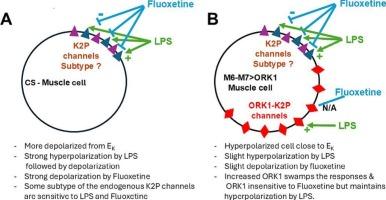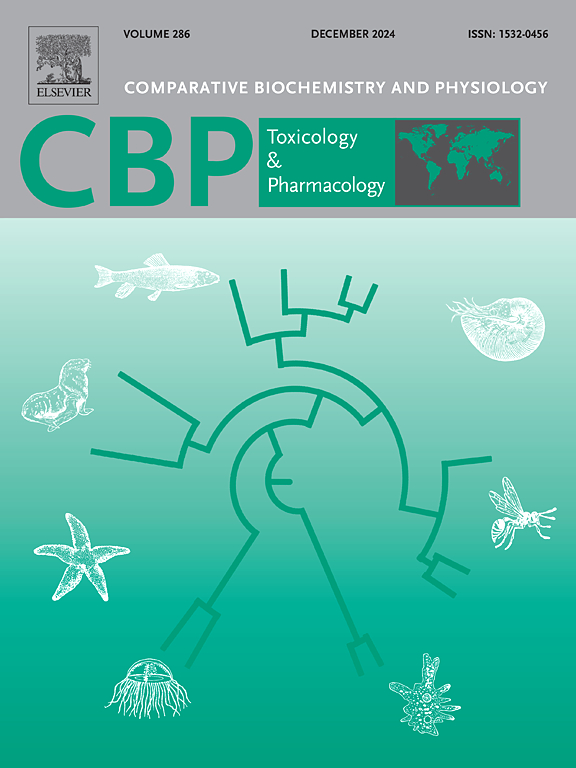氟西汀可拮抗 LPS 的急性反应:阻断 K2P 通道。
IF 3.9
3区 环境科学与生态学
Q2 BIOCHEMISTRY & MOLECULAR BIOLOGY
Comparative Biochemistry and Physiology C-toxicology & Pharmacology
Pub Date : 2024-09-20
DOI:10.1016/j.cbpc.2024.110045
引用次数: 0
摘要
负责维持静息膜电位的通道被称为 K2P(双 P-结构域 K+亚基)通道,已知其中的一部分会被氟西汀阻断。在本实验中,研究人员检测了化合物对过量表达 K2P 通道亚型(在果蝇中称为 dORKA1 或 ORKA1)的幼虫肌肉膜电位的影响,并与未过量表达的幼虫进行了比较。还观察了该化合物与一种能瞬时激活 K2P 通道的脂多糖(LPS)的顺序和/或组合。对不同浓度的氟西汀进行了测试,并与 LPS 一起进行了鸡尾酒试验。在接触 25 μM 氟西汀时,对照幼虫的肌肉发生去极化,而过表达 K2P 通道的肌肉则发生超极化;但在接触 50 μM 氟西汀时,观察到的反应差异更大。LPS在两个幼虫品系中都引起了超极化,但在Canton-S品系中这种效应比在K2P过表达者中更短暂。最后,即使在有氟西汀存在的情况下,LPS 仍会继续引起超极化,而氟西汀会在暴露于 LPS 期间迅速使肌肉去极化。与对照组相比,鸡尾酒对过表达 ORKA1 肌肉的影响较小,这表明氟西汀不会阻断 ORKA1 亚型。这项研究意义重大,因为它证明了 K2P 通道的过表达如何改变膜对 LPS 和氟西汀暴露的反应。本文章由计算机程序翻译,如有差异,请以英文原文为准。

Fluoxetine antagonizes the acute response of LPS: Blocks K2P channels
The channels responsible for maintaining resting membrane potential are known as K2P (two-P-domain K+ subunit) channels, a subset of which are known to be blocked by Fluoxetine. In this experiment, the compound's effects on the membrane potential were examined on muscles in larval Drosophila overexpressing a subtype of K2P channel (known in Drosophila as dORKA1 or ORKA1) and compared to larvae without overexpression. The compound was also observed in sequence and/or combination with a form of lipopolysaccharide (LPS) that transiently activates K2P channels. Different concentrations of Fluoxetine were tested, and it was also examined in cocktail with the LPS. At 25 μM Fluoxetine exposure, muscle in control larvae underwent depolarization, while muscles overexpressing K2P channels hyperpolarized; at 50 μM, however, much more variable responses were observed. The LPS caused hyperpolarization in both larval strains, but the effect was more transient in the Canton-S line than in the K2P overexpressors. Finally, LPS continued to cause hyperpolarization even in the presence of Fluoxetine, while Fluoxetine quickly depolarized the muscle during exposure to LPS. The cocktail showed a smaller effect on muscles overexpressing ORKA1 as compared to the controls, indicating that Fluoxetine does not block the ORKA1 subtype. This study is significant because it demonstrates how overexpression of K2P channels alters membrane response to LPS and Fluoxetine exposure.
求助全文
通过发布文献求助,成功后即可免费获取论文全文。
去求助
来源期刊
CiteScore
7.50
自引率
5.10%
发文量
206
审稿时长
30 days
期刊介绍:
Part C: Toxicology and Pharmacology. This journal is concerned with chemical and drug action at different levels of organization, biotransformation of xenobiotics, mechanisms of toxicity, including reactive oxygen species and carcinogenesis, endocrine disruptors, natural products chemistry, and signal transduction with a molecular approach to these fields.

 求助内容:
求助内容: 应助结果提醒方式:
应助结果提醒方式:


